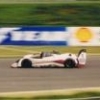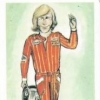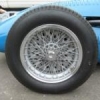I can't say I remember Ford ever crushing the opposition in any of those categories. Getting some good success, yes, but never dominating. I am not counting having a name on the DFV cam cover as being a real Ford effort. They did well for a couple of years with the GT40 before Porsche got serious. Rallying? A big player for many years, but never the dominant force that they could have been if they had really tried.
Well I did not say that Ford managed to crush the opposition, but their will - and financial commitment - to participate on a large scale, so as to crush the opposition, was much stronger chez Ford than with their contemporaries, certainly the Detroit ones. Ford appeared to be very focused on the youth market, and on building a strong name in motor sports which must have been seen as a key means of doing that. It was reflected in their contemporary advertising, like the example I quoted in my previous post.
Ford-derived engines dominated F3, and the FVA likewise in F2. The DFV and its derivatives to my mind dominated F1 for all those years. Ford paid Cosworth for the privilege of having a new and stardard-setting F1 power unit designed and built. They decided to support Lotus in their US efforts to win at Indianapolis, and that included coming up with the four-cam Indy V8. And Le Mans..."doing well" with the GT40 is, I feel, a bit of an understatement. Ford were out to crush Ferrari, who had turned them down...and left no stone unturned in order to do so. Look at the entry lists for Le Mans in 1966 and 1967! To my mind, Porsche were serious too, for much of that period, but their day would come with the rule changes that made the big V8s obsolete. Remember, we saw two LM wins for the "obsolete" JW GT 40s, after the Mk IV victory of 1967, and the subsequent pulling out of Ford's factory backing. As for rallying, the successes of the Cortina Lotus and the Escort variants, for so many years, was an outstanding feature of that branch of the sport. And saloon cars...goodness me: Screaming 1000cc Gr 5 Anglias and later Escorts in the smaller categories, Cortina Lotii, Falcon Futura Sprint, Mustangs and Galaxies... even getting fibre glass panels and aluminium bumpers homologated in Ford's efforts to dominate.
I was a young feller in the Sixties, gettng my driver's licence in 1966, and I was hugely impressed by the fact that one giant of the motor industry was putting such a mighty effort into the sport that I loved. But I should add that I never became a Ford man despite my admiration for their efforts. Among all the cars that I have owned since then, only an Elan Sprint and a Sierra Cosworth have a blue oval connection. Oh, and my self built C2 sports-racer did have a BDT engine... 



























